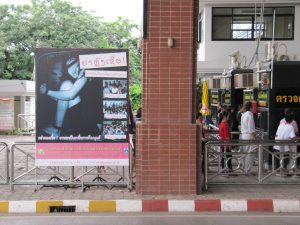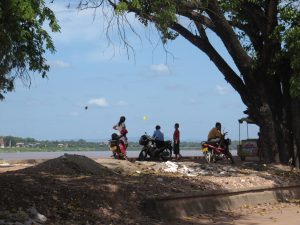Memo #157
The fifth Memo from the Theme, Labour Migration from Southeast Asia)
By Sverre Molland – sverre.molland [at] anu.edu.au
 Since the late 1990s, international organizations and NGOs have engaged with labour migrants in the Mekong region. This includes either advocating for migrants’ rights, or launching anti-trafficking programs. More recently, the term “safe migration” has surfaced within policy circles and the broader aid community with several organizations implementing “safe migration” programs.
Since the late 1990s, international organizations and NGOs have engaged with labour migrants in the Mekong region. This includes either advocating for migrants’ rights, or launching anti-trafficking programs. More recently, the term “safe migration” has surfaced within policy circles and the broader aid community with several organizations implementing “safe migration” programs.
But what exactly is “safe” about “safe migration?”
“Safe migration” echoes a legalization thesis common in debates regarding labour migration. Through legalization, the argument goes, the potential market for traffickers and exploiters is destroyed. Limiting exploitation increases labour remittances, thus contributing to development.
“Safe migration” programs advocate legal rights. But they make implicit assumptions regarding social relationships between migrants and brokers. Several aid organizations operate on the premise that “safe migration” either consists of officially licensed labour recruitment firms, or informal intimate networks of friends and extended kin. Within this framework, unauthorized brokers who are external to village communities are heavily associated with human traffickers and dubious migration requirements.
This model of “types” of brokers carries risks as it assumes informal networks and legal documents ensure “safe migration.” In the case of the sex commerce economy along the Thai-Lao border, recruitment is commonly carried out within informal and intimate social networks. The arrangements are usually but not always consensual.
On both sides of the Thai-Lao border, sex workers frequently go home to their village communities and occasionally engage in deceptive recruitment of acquaintances. The use of legal documents, such as passports, border passes, and working permits, is common. But rather than protecting the individuals, these documents are often appropriated as leverage by these brokering networks. The costs of work permits, for example, are born by the migrant in the form of increased debt bondage. Hence, there is a high level of risk within the very same social relationships that are assumed “safe” by anti-trafficking and “safe migration” programs.
The fact that several aid programs engage experienced migrants as “peer educators” is tragicomic. They might be the very same individuals these programs are attempting to combat in the laudable quest to ensure “safe migration” in the Mekong region.
About the Author:
Sverre Molland – Lecturer in Anthropology and Development at the Australian National University.
Links:
- Molland, Sverre. Safe Migration, Dilettante Brokers, and the Appropriation of Legality: Lao-Thai “Trafficking” in the Context of Regulating Labour Migration, Pacific Affairs, March 2012.
- The Perfect Business? Anti-Trafficking and the Sex Trade along the Mekong, July 2010. (Book by Sverre Molland)
- Molland, Sverre. The Trafficking of Scarce Elite Commodities: Social Change and Commodification of Virginity along the Mekong, The Asia Pacific Journal of Anthropology, April 2011.

